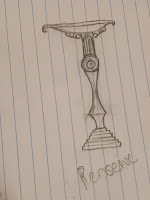3 of Gryffindor: Exploration
 <-- sketches
<-- sketchesMeaning of the card when it's facing you: preparation, foresight, expansion, enterprise
Meaning of the card when it's facing away from you: delays, lack of foresight
The Pensieve is a something that gives the user access to his or her memories by watching them happen in real time. It can represent expansion because it gives you more room in your head. It allows you to take a memory out of your brain and store it away from later. That way, you don't lose any of your thoughts and you make room for new ones. It can also help you expand your knowledge because sometimes even if you remember something, you might not remember it exactly and miss details that are important. with the Pensieve, that isn't a problem. It can be an enterprise because it is a successful in the things that it is supposed to do (which in this case would be storing peoples' memories and allowing them to view them when desired).
I'm not sure how foresight-y it is. You could probably make predictions and assumptions about the future from looking over your memories enough to find patterns or something. You could record moments of foresight, like Dumbledore did with Trelawney's prophecy. You could also have the foresight to save the memories in the Pensieve to view at a time when they are important.
Because the Pensieve lets you look at your memories, it can help you prepare for the reason that you can see what has happened and figure out might be happening. Harry was able to view memories that Dumbledore collected about horcruxes. Without this arsenal of information, Harry would not have been able to hunt down the horcruxes, or even have any idea what they might be. And without that, he would not have been able to defeat Voldemort.









